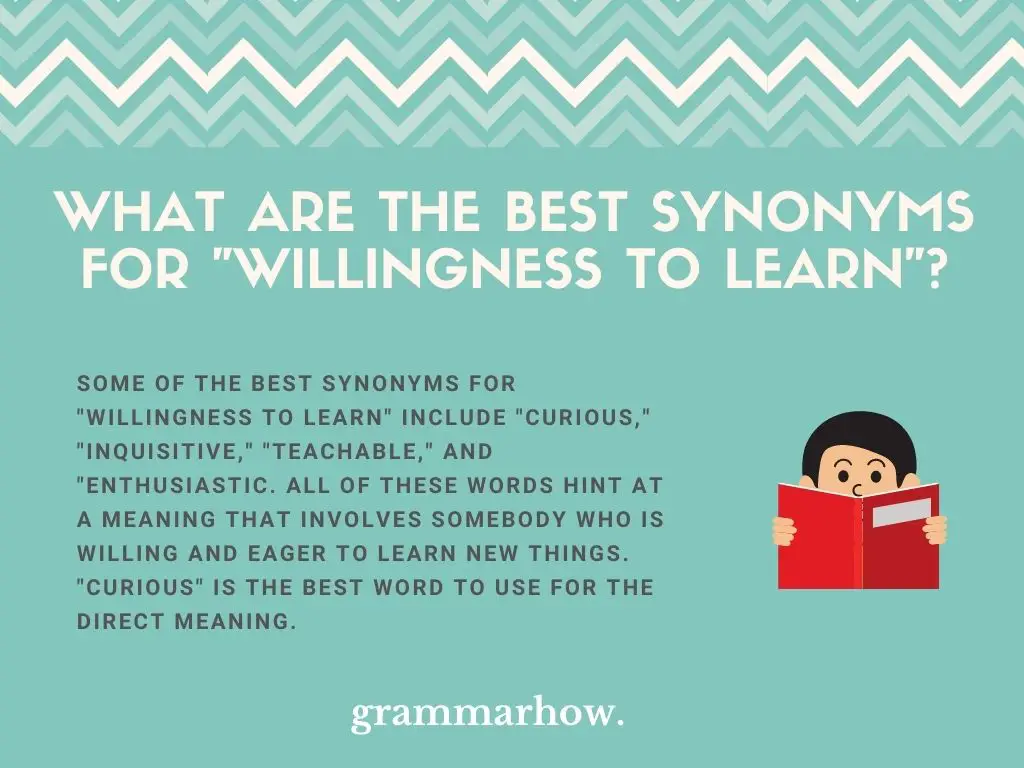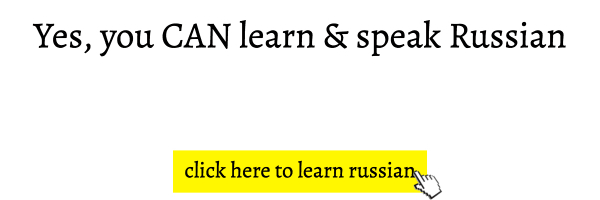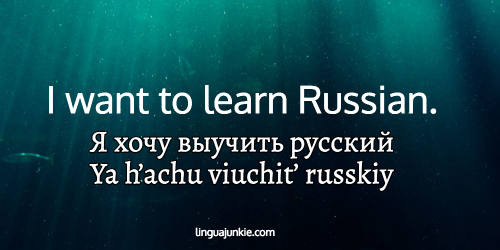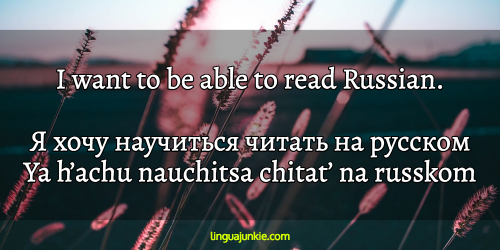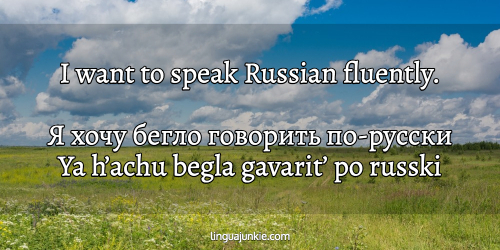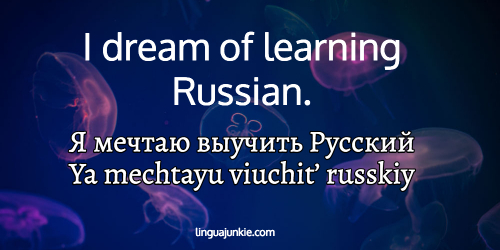want to learn — перевод на русский
I want to learn to catch bandits
Я хочу научиться ловить бандитов.
I want to learn stuff from you.
Хочу научиться у тебя все такому.
I want to learn how to play the igil.
Я хочу научиться играть на игиле.
Yes, I want to learn!
Да, я хочу научиться!
I want to learn to write and find a job in Hong Kong
Я хочу научиться писать и найти работу в Гонг Конге.
Показать ещё примеры для «хочу научиться»…
I do not want to learn.
Я не хочу учиться.
I want to learn music.
Я хочу учиться музыке.
I want to learn with the spirit of a good-willing father,
Я хочу учиться в духе хорошо образованного отца,
But I also wanted to learn.
Но я хочу учиться.
Just don’t want to learn how to dance.
Я не хочу учиться танцевать.
Показать ещё примеры для «хочу учиться»…
I want to learn. Will you learn me?
Я хочу узнать.
I want to learn to write the word on the tombstone
Я хочу узнать написать слово на tombstone
— No, but I want to learn.
— Нет, но я хочу узнать.
I want to learn about you and him and that life you lead.
Хочу узнать о тебе, о нём, о вашей жизни.
But Dad, I want to learn everything.
— Но папа, я хочу узнать всё.
Показать ещё примеры для «хочу узнать»…
Maybe I want to learn theirs.
Может, я тоже хочу выучить языки.
I kind ofjust want to learn the cobra thing.
Я тоже хочу выучить эти трюки с коброй
I want to learn English…
Я хочу выучить английский…
I didn’t know why I wanted to learn English…
Я не знаю, для чего я хочу выучить английский…
— I want to learn this.
— Я хочу выучить это.
Показать ещё примеры для «хочу выучить»…
I didn’t want to learn poems.
Я не хочу учить стихи!
Like, I don’t want to learn French… so everyday I think positive thoughts about not learning French.
Я, например, не хочу учить французский… и каждый день меня посещает позитивная мысль, что я не учу французский.
I want to learn science.
Я хочу учить естественные науки.
I want to learn Chen-style kung fu
Хочу учить стиль Чен.
I want to learn kung fu
Хочу учить кун-фу.
Показать ещё примеры для «хочу учить»…
If you want to learn, I’ll teach you.
Если хочешь, то я могу тебя научить.
Being a psychiatrist and saying you want to learn or study about psychedelics it’s, you know, it’s not that well received.
Быть психиатром и говорить, что ты хочешь изучать психоделики — это не то что нормально воспринимается обществом.
Perhaps you just want to learn the monster’s weaknesses.
Возможно, ты просто хочешь выявить слабости чудовища.
Or maybe you’re just afraid that your ex-wife has Clark’s ear, and you want to learn how to get it back A.S.A.P.
Или ты боишься того, что твоя бывшая жена имеет влияние на Кларка, и ты хочешь вернуть это влияние себе, чем скорее, тем лучше.
And look, if you really want to learn how to bang that thing, there’s no better teacher than your old dad.
И если ты действительно хочешь отодрать эту штуку, то твой старый папаша тебе поможет.
Показать ещё примеры для «хочешь»…
But if you want to learn…
Но если ты хочешь знать…
I mean, you want to learn more, read the papers,
Хочешь знать больше — почитай газеты,
You want to learn how to control this, how to shift, you do it through anger, by tapping into a primal animal rage, and you can’t do that with her around.
Хочешь знать, как управлять этим, как взростить в себе настоящий, животный гнев? Ничего не выйдет, пока она рядом.
What do you want to learn?
Что ты хочешь знать?
And if you really want to learn the truth, then there’s some things you should hear.
И если действительно хочешь знать правду, я тебе кое-что расскажу.
Показать ещё примеры для «хочешь знать»…
Because I want to learn from U.S. and A, yöur culture, and to understand from how a thing happen and to take this lesson back to my country.
Патамю шта я хотел изучать у Ассашай культура и хотел узнать, в чем секрет успеха и чтоб увезти уроки в Казахстан.
You wanted to learn Chinese… Mm, we’ll get you a book.
Ты хотел изучать китайский… мы купим тебе учебник.
I always wanted to learn classical music, but I never had the patience.
Я всегда хотел изучать классическую музыку, но никогда не хватало терпения.
Do you want to learn kung fu?
Ты хочешь изучать Кунг Фу?
You want to learn martial arts?
Хочешь изучать Вин Чунь?
Показать ещё примеры для «хотел изучать»…
— And if I want to learn how to shoot?
А ЕСЛИ БЫ Я ВЫРАЗИЛ ТАКОЕ НЕОБЫЧНОЕ ЖЕЛАНИЕ, НАУЧИТЬСЯ СТРЕЛЯТЬ
I mean, for example, would you want to learn sailing at all?
Ты, например, хотела бы научиться плавать под парусом? Или гольфу?
Why do you want to learn how to massage all of a sudden?
Чего это ты надумала массажу научиться?
There’s so much more I want to learn and do.
Столькому всему я еще могу научиться и сделать.
I want to re-enlist. I want to learn to fly choppers.
Я хочу вернуться на военную службу, научиться летать на вертолете.
Показать ещё примеры для «научиться»…
Want to learn some kill moves?
Хочешь изучить пару убойных ударов?
If you want to learn about man’s true nature, I can offer you a complete education… on the field of battle.
Если ты хочешь изучить истинную человеческую натуру, я могу предложить тебе полное обучение… на поле боя.
Why does she want to learn graphology?
Почему она хочет изучить графологию?
«Did they really want to learn the secrets
Похоже они действительно хотят изучить тайны
I mean, maybe they just wanted to learn about us.
Может они просто хотят нас изучить.
Показать ещё примеры для «хочешь изучить»…
Отправить комментарий
Finding the correct word for eager to learn doesn’t have to be a challenge. It’s great to expand your vocabulary and broaden your knowledge if you can put a word to a description. In this article, we’ll look at good words for a willingness to learn and how to use them.
What Are The Best Synonyms For “Willingness To learn”?
Some of the best synonyms for “willingness to learn” include “curious,” “inquisitive,” “teachable,” and “enthusiastic. All of these words hint at a meaning that involves somebody who is willing and eager to learn new things. “Curious” is the best word to use for the direct meaning.
According to The Cambridge Dictionary, the definition of “curious” is “interested in learning about people or things around you.”
So, in this article, we’ll look at the following words and how they relate to the phrase “willingness to learn:”
- Curious
- Inquisitive
- Teachable
- Enthusiastic
Curious
“Curious” is by far the most compatible word with the meaning we’re looking for. You can use it to mean precisely that somebody is willing to learn about something.
Someone that is “curious” is interested in learning new things. Those things can be about people or things, and the curious person is always interested to find out more.
For the most part, “curious” is a positive adjective we can use to describe somebody who is willing to learn new things. It’s a great way to use a quick and easy word to convey your meaning.
- I’m curious about history, so I asked my teacher for more textbooks.
- He was curious about what was inside the cave and found some amazing things.
- My children have always been curious souls. They’re constantly finding new things to entertain themselves with.
- You’re a curious being, aren’t you!
As you can see, “curious” is a great word to use when talking about somebody who is willing to learn all about new things. You’ll usually use it in a positive way, though that isn’t always the case.
Sometimes, “curious” is used as a negative adjective. That means that people might call someone “curious” who’s a little too eager to learn about new things. While it’s usually good to be happy to learn about things, some people go overboard and put themselves in danger to learn.
You may have heard the old idiom:
- Curiosity killed the cat.
It’s this idea that sometimes lets “curious” be painted in a negative light.
Inquisitive
Next, we want to talk you through “inquisitive.” It’s another great synonym to use and is definitely up there with “curious.” Many people like to use “inquisitive” as a way to talk about somebody who is willing to learn.
“Inquisitive” means that somebody wants to discover and explore new possibilities. They always have a thirst to try new things and won’t rest until they’ve satisfied that thirst.
According to The Cambridge Dictionary, the definition of “inquisitive” is “wanting to discover as much as you can about things.”
Just like “curious,” “inquisitive” comes with both positive and negative connotations. For the most part, it’s a very positive adjective that you can use to describe somebody who is willing to learn all kinds of new things about the world and the people around them.
- I like to be inquisitive about new things and don’t stop learning until I’ve mastered them (which will never happen)!
- He’s so inquisitive about things. You honestly will never beat him at a strategy game.
- You’re the most inquisitive person I’ve ever met. You’ll find a way to appeal to the masses.
- He’s far too inquisitive to be kept here at the office! You need a grander job that appeals to your capabilities.
“Inquisitive” is a great word to use to talk about somebody who is willing to learn. Usually, “inquisitive” people are slightly more impressive than “curious” people because they often have a tactical thought process or are capable of more critical thinking skills.
Generally, “inquisitive” people are also “intelligent” people, while “curious” people might simply be interested in learning new things.
However, “inquisitive” can also be used negatively. You might find yourself calling someone “too inquisitive” when their eagerness to learn about new things annoys you.
In fact, The Cambridge Dictionary definition in full looks like this:
- wanting to discover as much as you can about things, sometimes in a way that annoys people
Teachable
“Teachable” is another great word to use as a replacement to “willingness to learn.”
“Teachable” is used as an adjective to mean that somebody is capable of being taught new things. It usually implies that they’re willing to learn all about new things, making them an easy candidate to teach.
According to The Cambridge Dictionary, the definition of “teachable” is “able to be taught; that can be taught.”
Most of teaching works better when the people you’re teaching are receptive to what you’re saying. If they’re intent on listening and learning, then someone will have a much better time learning from you. It’s these teachable people that make it worthwhile to be a teacher.
- He’s such a teachable student; I couldn’t ask for someone better!
- You’re so teachable. I always have fun studying and teaching with you.
- My teacher said I’m a teachable pupil.
Enthusiastic
Finally, let’s look at “enthusiastic.” This is a great synonym to use, but it doesn’t always relate to a willingness to learn. Enthusiasm can extend to a wide variety of things in life.
“Enthusiastic” means that somebody is eager to do new things. It doesn’t always have to be learning. You can be enthusiastic about a new hobby or a new sport.
According to The Cambridge Dictionary, the definition of “enthusiastic” is “showing enthusiasm.” This means that someone is eager to learn all about new things.
- I’m an enthusiastic person when I’m introduced to new ideas.
- They’re so enthusiastic, and I can’t believe how happy they are to learn about such a boring subject!
- You’re so enthusiastic about school all the time!
While it doesn’t strictly refer to a willingness to learn, it can still be used correctly in that context. That makes it an excellent candidate to use as a synonym.
Martin holds a Master’s degree in Finance and International Business. He has six years of experience in professional communication with clients, executives, and colleagues. Furthermore, he has teaching experience from Aarhus University. Martin has been featured as an expert in communication and teaching on Forbes and Shopify. Read more about Martin here.
Предложения:
want to learn
На основании Вашего запроса эти примеры могут содержать грубую лексику.
На основании Вашего запроса эти примеры могут содержать разговорную лексику.
я хочу выучить
я хочу учиться
я хочу узнать
я хочу изучать
я хочу изучить
я хочу учить
я хочу познать
хочется учиться
Я хочу уметь
я хочу научиться
I want to learn Chinese first so I can give it to you in your native tongue.
Сначала я хочу выучить китайский, чтобы я мог дать тебе это на твоем родном языке.
I want to learn as quickly as possible because I know it will help me to integrate and adapt here.
Я хочу выучить его как можно скорее, потому что это поможет мне адаптироваться и интегрироваться.
My only approach is that I want to learn from my co-actors, since all of them are very talented.
Мой единственный подход заключается в том, что я хочу учиться у своих соратников, поскольку все они очень талантливы.
I go to school because I want to learn.
If I see something I love, I want to learn everything about it.
Если я вижу то, что люблю, я хочу узнать все об этом.
I can’t forget the things Sara told me and I want to learn more.
Я не могу забыть то, что Сара рассказывала мне и я хочу узнать больше.
I want to learn a new language.
I want to learn about my family.
Now, we all know that I have made mistakes, but I want to learn.
Теперь мы все знаем что я делал ошибки, но я хочу учиться.
I want to learn something concrete, scientific and useful.
Я хочу учиться чему-то конкретному, научному и полезному.
I want to learn all the words on this list by the end of July.
I want to learn more on this LOA.
I set off for Spain shortly where I want to learn about the experiences of Spanish social organizations.
Я вскоре еду в Испанию, где я хочу узнать опыты тамошних общественных организаций.
We request the teachings: Please, I want to learn.
Мы обращаемся с просьбой об учении: «Пожалуйста, я хочу учиться.
I want to learn French and then Italian.
I want to learn this skill.
I want to learn from this situation.
Besides, I want to learn about real life.
I want to learn more about each subject.
I want to learn to meditate without needing anything.
Результатов: 821. Точных совпадений: 821. Затраченное время: 151 мс
Documents
Корпоративные решения
Спряжение
Синонимы
Корректор
Справка и о нас
Индекс слова: 1-300, 301-600, 601-900
Индекс выражения: 1-400, 401-800, 801-1200
Индекс фразы: 1-400, 401-800, 801-1200
“I want to learn Russian”
Oh, hello!
Do you really want learn it? And how do you say that in Russian? You say “Ya h’achu viuchit’ russkiy.” In Russian, that would look like this: Я хочу выучить русский.
In this article, you will indeed learn some Russian. You will: ① learn how to say “I want to learn Russian” in many ways, and ② actually get some ways to learn Russian: Apps, Textbooks and Russian courses.
Ready? Keep reading.
First, let’s learn how to say “I want” in Russian. If you say “I want to learn Russian” you better know how to say “want.” Here’s how: Я хочу … (Ya h’achu…).
“Я” is “I” and “хочу” is “want.” It’s just like in English. And the good news is that it’s the same for all genders.
Let’s have a look at the some examples:
- Я хочу поздравить Вас
- Ya h’achu pozdravit’ vas
- I want to congratulate you
- Я хочу увидеть мир
- Ya h’achu uvidet’ mir
- I want to see the world
By the way, you should also HEAR some real Russian.
So, while you read this lesson, listen to this free Russian Audio Lesson. It’s a bit unrelated but you will learn Russian greetings.
- Lesson: 3-Minute Russian – Greetings
- by RussianPod101 – click here for more easy Russian lessons
Now, onto the “I want to learn Russian” phrases.
- Я хочу выучить русский
- Ya h’achu viuchit’ russkiy
We already know the how to say the first part of the sentence, now we’re going to discuss the rest of it.
“выучить” (viuchit’) here means “to learn” and “русский” (russkiy) is “Russian.”
Remember that the (t’) sound you see above is a softer “t” than the one we’re used to pronounce in English.
2. I want to be able to read Russian – Я хочу научиться читать на русском
- Я хочу научиться читать на русском
- Ya h’achu nauchitsa chitat’ na russkom
Here “научиться” (nauchitsa) has the meaning of “to learn”, “читать” (chitat’) stands for “to read” and the word combination “на русском” (na ruskom) means “in Russian.”
3. I want to speak Russian – Я хочу говорить по-русски
- Я хочу говорить по-русски
- Ya h’achu gavarit’ po russki
The Russian for “to speak” is “говорить” (gavarit’) and “по-русски” (po russki) literally means “in Russian.”
4. I will learn Russian – Я выучу русский язык
- Я выучу русский язык
- Ya viuchu russkiy yazik
You can say this phrase when you’re sure that you can and you will learn the Russian language.
“выучу” (viuchu) is a verb in the future form meaning “I will learn” and “русский язык” (russkiy yazik) is “Russian language” just as easy!
5. I want my Russian to be better – Я хочу улучшить свой русский
- Я хочу улучшить свой русский
- Ya h’achu ulutshit’ svoy russkiy.
When you already know the basics of Russian you will naturally want to improve it, in this case you can say this phrase. “улучшить” (uluchshyt’) stands for “to make better” and “свой” (svoy) means “my.”
6. I want to speak Russian better – Я хочу лучше говорить по-русски
- Я хочу лучше говорить по-русски
- Ya h’achu lutshe gavarit’ po russki
This one is good for the case when you want to improve your Russian speaking skills. “luchshe” (luchshe) is simply “better.” All the other words in this sentence are already familiar to job. Good job!
7. I want to speak Russian fluently – Я хочу бегло говорить по-русски
- Я хочу бегло говорить по-русски
- Ya h’achu begla gavarit’ po russki
In this sentence the word “бегло” (begla) has the meaning of “fluently.” Remember this one because it’s your goal!
8. I want to understand Russian – Я хочу понимать русский
- Я хочу понимать русский
- Ya h’achu panimat’ russkiy
The only new word for you here is “понимать” (panimat’) and it can be translated as “to understand” in English.
9. I’ll start studying Russian today – Я начну изучать русский сегодня
- Я начну изучать русский сегодня
- Ya nachnu izuchat’ russkiy sevodnya
Don’t just say it – dot it! Start doing your first steps this very day and you’ll see how your Russian becomes better.
“начну” (nachnu) has got the meaning of “I will start”, “изучать” (izuchat’) means to learn / to study and “сегодня” (sevodnya) stands for “today.”
10. I dream of learning Russian – Я мечтаю выучить Русский
- Я мечтаю выучить Русский
- Ya mechtayu viuchit’ russkiy
Learn and memorize the phrases in this article and you’ll approach a few steps closer to your dream to come true.
If you want to say that you dream of something in Russian say “Я мечтаю” (ya mechtayu) – “I dream.” Pretty easy, isn’t it?
11. I’d like to study Russian… – Мне бы хотелось выучить русский
- Мне бы хотелось выучить русский
- Mnye bi h’atelas’ viuchit’ russkiy
“Мне бы хотелось” (mnye bih h’atelas’) is a more polite way to say “I want to…”
You can also use this construction before you wish to initiate or add something in a polite manner. Here’s an example:
“Мне бы хотелось сказать…” (Mnye bih h’atelas’ skazat’) – I’d like to say…
And one more thing we should note here is the Russian particle “бы” (bih) which means “would, could have.” In this case it is used to express a wish or a desire to do something.
12. It would be great to know Russian… – Было бы неплохо знать русский
- Было бы неплохо знать русский
- Byla bih neploh’a vyuchit’ russkiy
- Word for word translation: It would be not bad to learn Russian
This example is another way to express your desire to learn Russian.
In this sentence we see another example of using particle “бы” (bih). “Было бы” (byla bih) literally means “would be.”
Now let’s move forward to the word “неплохо” (neploh’a) which has the direct meaning of “not bad”, but it can also be translated as “good, nice, great.”
The phrase “было бы неплохо” (byla bih neploh’a) is quite often used in the Russian language, especially in everyday speech, when you want to initiate something or make a hint that you want to do something. Have a look at the examples down below:
- Был бы неплохо поехать в отпуск (Byla bih neploh’a poeh’at’ v otpusk) – I would be nice if we could go on a holiday.
- Было бы неплохо, если бы вы приехали навестить нас (byla bih neploh’a, esli bih vy prieh’ali navestit’ nas) – It would be great if you could come and visit us.
Conclusion: Now, you can say “I want to learn Russian.”
You can also talk about reading, speaking and understanding this language. Just re-read and repeat these lines some more if you want to master them.
But wait, what’s that? You say you want to learn MORE?
Well, my friend, check out the links below for resources:
- How to Learn Russian in 5 Minutes
- Best Russian Textbooks
Written by the Main Junkie
P.S. Want to learn & speak the Russian language?
Check out RussianPod101, a complete Russian learning program with 1,000+ audio and video lessons, apps, study tools, eBooks and PDF lesson notes. I think their lessons can and will help you learn and speak Russian.
Click here get a FREE Lifetime Account & speak Russian with fast + easy lessons
-
Video Explanations
- Blog
- Printable Worksheets
- Store
- Login
-
0
Cart
- K-8th Grade
- K-8th Grade
- ArgoPrep for Families
- ArgoPrep for Educators
- Video Explanations
- Promoting Learner Variability
- Store
- Printable Worksheets
- Purchase Workbooks
- K-8th Grade
- SHSAT
- SHSAT Program
- What is SHSAT?
- Reading Comprehension
- SHSAT Test Dates
- SHSAT Test FAQ
- SHSAT Practice Test
ENTER BELOW FOR ARGOPREP’S FREE WEEKLY GIVEAWAYS. EVERY WEEK!
FREE 100$ in books to a family!
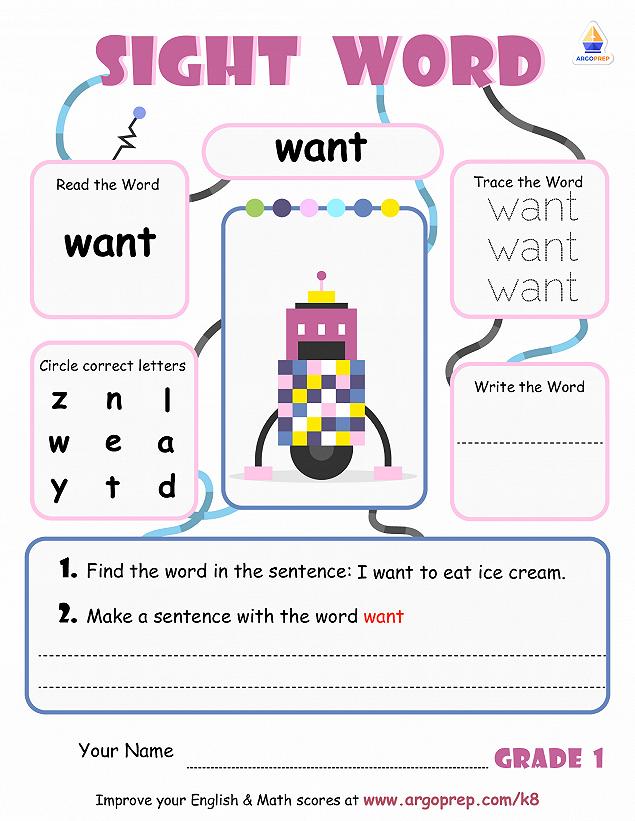
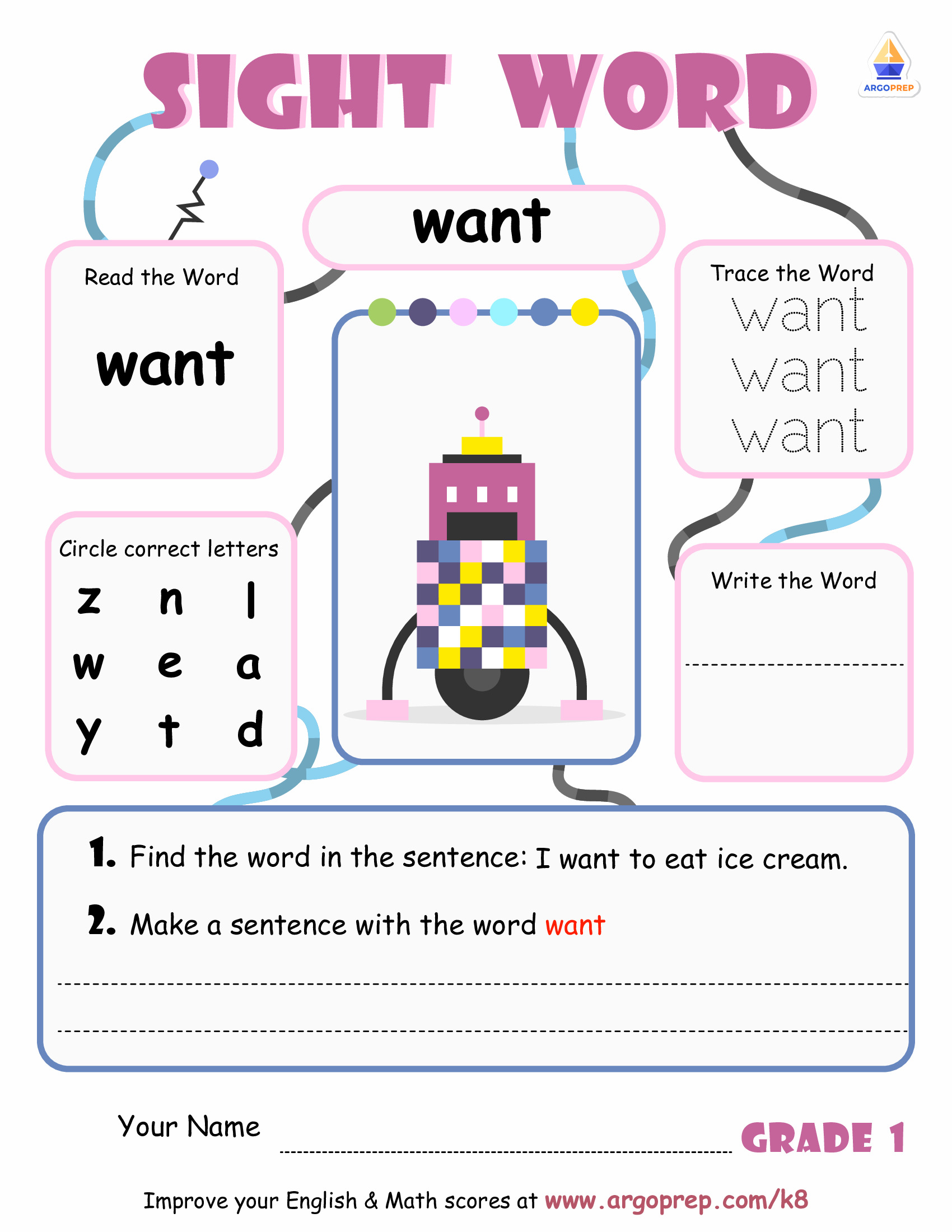
Your students will “want” to learn with this colorful worksheet! Sight words are key for reading success, and this resource allows them the opportunity to identify, read, trace, color, and write a sentence with the word “want.” Watch them shine and let them show you what they know about reading!
Read More
Description
Your students will “want” to learn with this colorful worksheet! Sight words are key for reading success, and this resource allows them the opportunity to identify, read, trace, color, and write a sentence with the word “want.” Watch them shine and let them show you what they know about reading!

